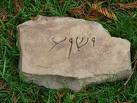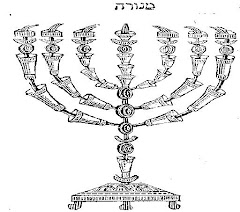Talmud - Mas. Sukkah 52a
And the land shall mourn, every family apart; the family of the house of David apart, and their wives
apart.1 Is it not, they said, an a fortiori argument? If in the future2 when they will be engaged in
mourning and the Evil Inclination will have no power over them,3 the Torah4 nevertheless says, men
separately and women separately, how much more so now5 when they are engaged in rejoicing and
the Evil Inclination has sway over them.6
What is the cause of the mourning [mentioned in the last cited verse]?1 — R. Dosa and the Rabbis
differ on the point. One explained, The cause is the slaying of Messiah the son of Joseph,7 and the
other explained, The cause is the slaying of the Evil Inclination.
It is well according to him who explains that the cause is the slaying of Messiah the son of Joseph,
since that well agrees with the Scriptural verse, And they shall look upon me because they have
thrust him through, and they shall mourn for him as one mourneth for his only son;8 but according to
him who explains the cause to be the slaying of the Evil Inclination, is this [it may be objected] an
occasion for mourning? Is it not rather an occasion for rejoicing? Why then should they weep? —
[The explanation is] as R. Judah expounded: In the time to come9 the Holy One, blessed be He, will
bring the Evil Inclination and slay it in the presence of the righteous and the wicked. To the
righteous it will have the appearance of a towering hill, and to the wicked it will have the appearance
of a hair thread. Both the former and the latter will weep; the righteous will weep saying, ‘How were
we able to overcome such a towering hill!’ The wicked also will weep saying, ‘How is it that we
were unable to conquer this hair thread!’ And the Holy One, blessed be He, will also marvel together
with them, as it is said, Thus saith the Lord of Hosts, If it be marvellous in the eyes of the remnant of
this people in those days, it shall10 also be marvellous in My eyes.11
R. Assi stated, The Evil Inclination is at first like the thread of a spider, but ultimately12 becomes
like cart ropes, as it is said, Woe unto them that draw iniquity with cords of vanity, and sin as it were
with a cart-rope.13
Our Rabbis taught, The Holy One, blessed be He, will say to the Messiah, the son of David (May
he reveal himself speedily in our days!), ‘Ask of me anything, and I will give it to thee’, as it is said,
I will tell of the decree etc. this day have I begotten thee, ask of me and I will give the nations for thy
inheritance.14 But when he will see that the Messiah the son of Joseph is slain, he will say to Him,
‘Lord of the Universe, I ask of Thee only the gift of life’.’As to life’, He would answer him, ‘Your
father David has already prophesied this concerning you’, as it is said, He asked life of thee, thou
gavest it him, [even length of days for ever and ever].15
____________________
(1) Zech. XII, 12.
(2) The time alluded to in the text cited.
(3) So that levity is least to be expected.
(4) Sc. Scripture, in the statement ‘and their wives apart’.
(5) At the festivities of the Water-Drawing.
(6) And undue levity is most likely.
(7) The precursor of the Messiah ben David, the herald of the true Messianic age.
(8) Zech. XII, 10.
(9) The Messianic age.
(10) E.V., ‘Should it’.
(11) Zech. VIII, 6.
(12) If the man continues to yield to temptation.
(13) Isa. V, 18.
(14) Ps. II, 7 and 8.
(15) Ps. XXI, 5.



.jpg)






(le-havdil), Regarding the Mashiakh:
ReplyDelete”There is an unequivocal criteria for discerning the Mashiakhַ or a navi ( lit. "the one bringing"; i.e., a prophet; one who calls, proclaims, prophesies): Dәvâr•im′ 13.1-6. תּוֹרָה (Torah) sets forth the acid test, whether the alleged Mashiakh ( מָשִׁיחַ) or נָבִיא (navi) advocates to keep, or displace, תּוֹרָה. Partial (i.e., selective) observance entails rejection of מִצווֹת (mitzwot; commandments) that are non-selected, which is rejection of תּוֹרָה in its indivisible whole. There is no middle ground.”
( Quote “1993 covenant” by Paqid Yirmeyahu Ben Dawid (found here: www.netzarim.co.il) (slightly edited by me).
The historical Ribi Yehoshua ha-Mashiakh (the Messiah) (his teachings are found in www.netzarim.co.il) (the only legitimate Netzarim) kept and taught Torah all of his life. A logical analysis of all the first centuries relevant documents proves that his Netzarim-talmidim (apprentice-students) did likewise. To be one of Ribi Yehoshuas Netzarim-talmidim (apprentice-students) one must do likewise (learn more in the above website). One mitzwah is Torah is subordination to a beit-din. Those whom want to follow Ribi Yehoshua must subordinate to the beit-din ha-Netzarim.
Anders Branderud